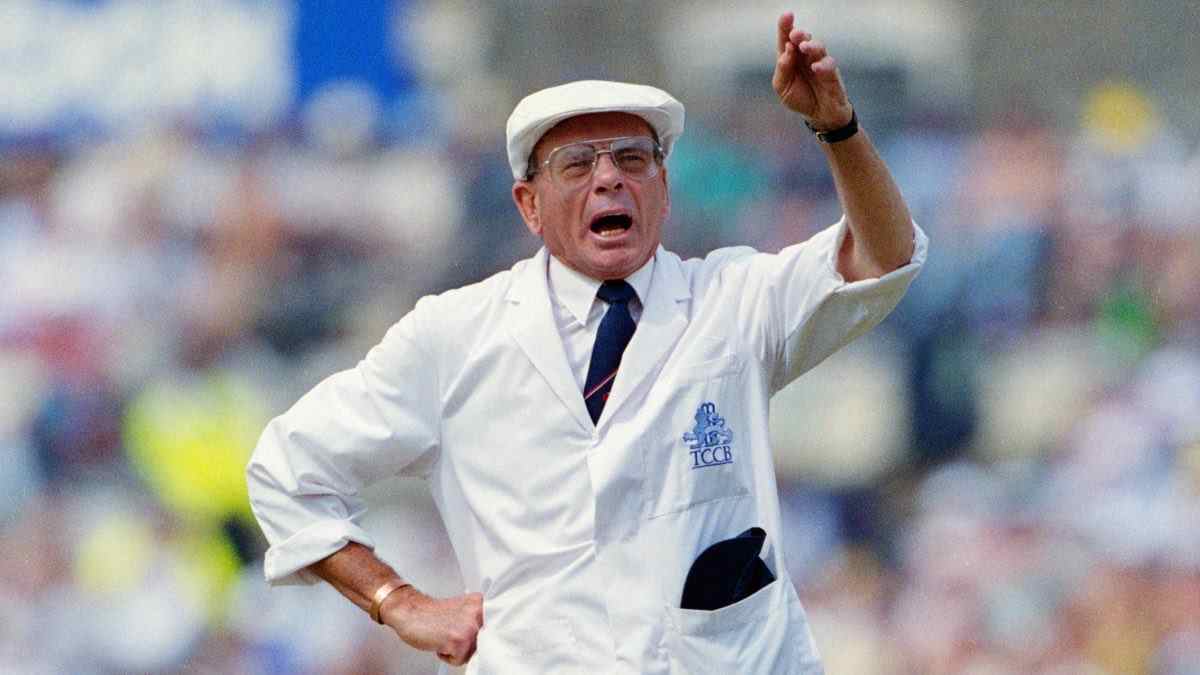Celebrated cricket umpire Harold Dennis “Dickie” Bird dies aged 92, leaving behind a remarkable legacy in world cricket.

Celebrated cricket umpire Dickie Bird, one of the sport’s most iconic and beloved figures, died on September 23 at the age of 92, leaving behind a legacy that transcended cricket’s boundaries and united fans worldwide in tributes and fond memories.
Bird was renowned not just for his sharp judgment and fairness on the field but also for his eccentricities, warm humour, and the affection he inspired among players and spectators alike.
Life and early career
Harold Dennis “Dickie” Bird was born in Barnsley, Yorkshire, in 1933 to a coal miner, a humble beginning that shaped his values and character. Bird represented Yorkshire and Leicestershire, scoring over 3,000 first-class runs, including two centuries, before a knee injury forced his early retirement at the age of 32.
Yet, it was as an umpire that Bird made his indelible mark on the game, beginning with his first county match in 1970 and his historic first Test assignment in 1973, the famous Headingley clash between England and New Zealand.
Read More: Former Australia captain & coach Bob Simpson dies aged 89; Was key to Australia’s revival in the 80s
Very sad to hear the news about my friend Dickie… pic.twitter.com/vDAAdtksIW
— Sir Geoffrey Boycott (@GeoffreyBoycott) September 23, 2025
Legendary umpiring legacy
Dickie Bird is widely regarded as cricket’s most famous umpire, overseeing a world-record 66 Test matches and 69 ODIs, including three World Cup Finals between 1973 and his retirement in 1996.
His attention to detail, firm yet compassionate handling of players, and his reputation for being a “hardly ever LBW” umpire gave his decisions an air of certainty, even opponents seldom disputed his calls.
Bird was impeccable when interpreting rules, particularly on issues like intimidatory bowling and pitch conditions, sometimes refusing to start play despite sunny weather if the outfield was unfit.
His final Test at Lord’s in 1996 between England and India was marked by a touching guard of honour from both teams and a standing ovation from the crowd. Notably, he made a correct decision by turning down a catch appeal against debutant Sourav Ganguly, who went on to score 131 runs, and made his last official call by giving Jack Russell out LBW to Ganguly in the second innings. Bird’s last county match was in 1998, and he later briefly returned in 2007 for a legends series.
Read More: Anshuman Gaekwad: Best remembered for standing tall against West Indies’ fearsome quartet
Famous decisions and eccentricities
While much of Bird’s legend arose from his personality, the twitching shoulders, the iconic white cap, the forearm stretch, his career was punctuated by memorable decisions and episodes. In the 1980 Centenary Test at Lord’s, Bird refused to allow play due to waterlogged outfield despite pressure from officials and fans, prioritising player safety. During an IRA bomb scare, he calmly sat with players in the centre of the pitch, displaying unflappable composure.
Bird was also at the centre of cricket’s first ever World Cup final in 1975, and famously lost his white hat to an overzealous fan during the pitch invasion.
Dickie Bird, you absolute legend of English Cricket. May you rest in peace knowing that you were loved by all!
— Kevin Pietersen🦏 (@KP24) September 23, 2025
I had so many amazing moments with Dickie.
A remarkable character that will be missed dearly! 🙏🏽
Tributes and remembrance
The world of cricket mourned Dickie Bird’s passing but celebrated a life “married to cricket,” with outpourings from every corner of the sport. Yorkshire County Cricket Club issued a heartfelt statement, hailing him as one of their greatest characters and remembering his tireless support for the club. Bird’s autobiography sold more than a million copies, becoming the UK’s biggest-selling sports book, and he later served as Yorkshire’s president, even personally funding new facilities for the team.
Players, fans, and journalists described him as a “national treasure,” whose wit and warmth made cricket richer and more human.
Sir Geoffrey Boycott, cricket commentator and former English cricketer, while remembering Bird, said, “He was a very good batsman but nerves got the better of him when he stepped up to play for YCCC and he could never quite hold down a place in the first team. Players all over the world respected and admired him for his firmness, fairness and he did it with a sense of humour. He was loved by so many and became a legend.”
Notably, Bird received an MBE in 1986 and an OBE in 2012 for his services to the game. In Barnsley, a statue stands as a permanent tribute. He never married, stating his only regret was prioritising cricket over family.
It is with profound sadness that The Yorkshire County Cricket Club announces the passing of Harold Dennis “Dickie” Bird MBE OBE, one of cricket’s most beloved figures, who died peacefully at home at the age of 92.
— Yorkshire CCC (@YorkshireCCC) September 23, 2025
Read More: Remembering Andrew Symonds: Hero of Australia’s 2003 WC triumph and T20’s Early Pioneer

